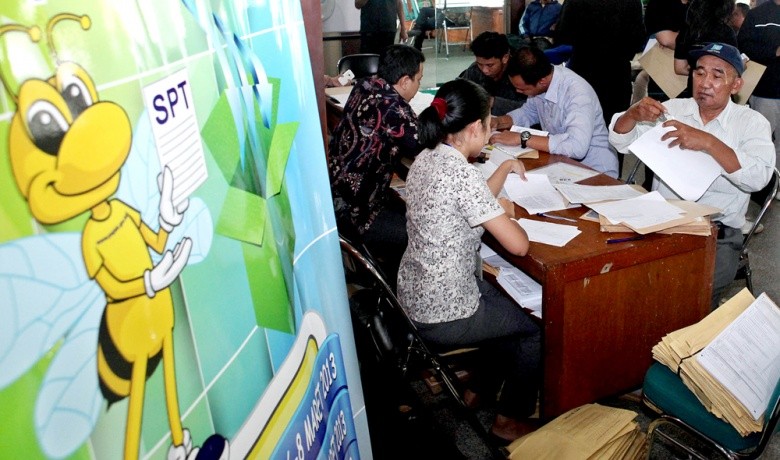
World Bank calls for stronger tax collection to bring 115 million Indonesians into middle class
by Adrian Wail AkhlasThe World Bank has called on the government to strengthen tax collection to stimulate growth amid tax reforms plans that will lower tax revenue.
World Bank acting country director for Indonesia Rolande Pryce said the government’s plan to relax corporate income tax, among other things, would reduce the tax-to-GDP ratio by 0.5 percent. Indonesia’s tax to GDP ratio stood at 10.7 percent in 2017, the lowest among regional peers.
At the same time, Indonesia will need funds to scale-up infrastructure, improve education and create a stronger safety net to lift 115 million “aspiring middle class” Indonesians out of economic insecurity.
“Without complementary revenue-raising measures, this will translate to less money being available to close the infrastructure and human capital gaps,” said Pryce in Jakarta on Thursday at the launch of the Bank’s Aspiring Indonesia – Expanding the Middle Class report.
Pryce said Indonesia would need to strengthen revenue generation by broadening the tax base and improving tax administration, adding that the country’s tax to GDP ratio was among the lowest in the world.
The government’s planned tax reforms in the omnibus bill on taxation include lowering the corporate income tax, relaxing income tax for Indonesians and expatriates, eliminating dividend taxes and imposing a new digital economy tax.
According to the World Bank’s latest report, 115 million or 45 percent of Indonesians have lifted themselves out of poverty but have yet to achieve full economic security. The group was likely to move up the economic ladder but was also as likely to slip down to the vulnerable group.
Pryce said adopting the right policies would be crucial to stimulate development, adding that the group categorized as the aspiring middle class spent Rp 532,000 (US$39.1) to Rp 1.2 million per person per month.
“Having the right policies can unlock Indonesia’s development potential and propel the country to high-income status,” she added.
President Joko “Jokowi” Widodo conveyed in his inaugural speech in October 2019 the nation’s vision to be a developed country with a GDP among the top five in the world and a near-zero percent poverty rate by 2045.
World Bank regional director for equitable growth, finance and institutions Hassan Zaman said Indonesia needed to create more jobs with better pay, backed by a robust system to provide quality education and universal health coverage to help lift the economically insecure groups to the middle class.
“Middle class growth requires reforms to improve the business environment to create good jobs, investment in the necessary skills and a social protection system that cushions against shocks,” Zaman said.
The report mentioned that Indonesia had made remarkable progress over the past 15 years in reducing poverty, which was now below 10 percent from a total of around 267 million people.
Despite the massive reductions in poverty, 35 percent of Indonesians remain poor or vulnerable, 45 percent are considered aspiring middle class and 20 percent of the population belong to the middle class. The remaining population belongs to the upper-class category.
The report highlighted that Indonesia’s GDP was $657 per person in 1967, making it one of the poorest countries in the world. Over the next 50 years, it stated, growth averaged 5.6 percent annually and the per capita GDP was now six times higher at nearly $4,000.
Finance Minister Sri Mulyani Indrawati said the government would expand the taxpayer base and intensify compliance among taxpayers to compensate for the low tax revenue.
“We are looking to tax economic sectors that have yet to contribute to tax revenue,” Sri Mulyani told reporters on the sidelines of the World Bank’s report launch. “Tax management will be improved, including its human resources and the information and technology systems.”
The government, she went on to say, planned to tax digital companies operating in Indonesia, such as Netflix and YouTube, through an omnibus bill on taxation. The government will need more contribution from the private sector to help develop the country, Sri Mulyani added.
The tax office collected Rp 1.33 quadrillion in tax revenue in 2019, 84.4 percent of the full-year target, causing a shortfall of Rp 245.5 trillion, the worst in at least the last five years.
President Joko “Jokowi” Widodo welcomed the World Bank’s report, saying the government will pay attention to its recommendation to adopt the most effective policies for economically insecure Indonesians, according to the president’s spokesperson, Fadjroel Rachman.
“The Jokowi administration’s decision to introduce omnibus bills on taxation, job creation and the new capital city is expected to push Indonesia to become a high-income country,” said Fadjroel.